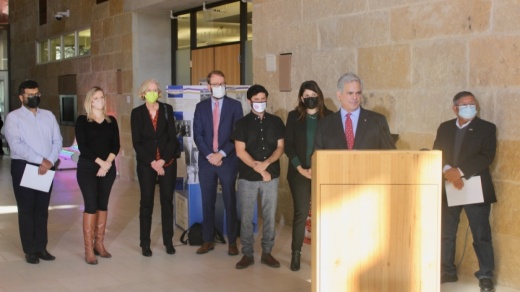On Nov. 30, Austin City Council members gathered to share ideas for addressing what some have labeled a regional housing crisis.
Plans for this work session came together earlier in November, with Mayor Steve Adler and others noting a need to circle back to housing—a top council priority prior to the pandemic.
Council heard briefings on the state of the local housing market from city staff and consultants, and discussed the council members’ policy proposals.
During a midday press conference, Adler ceremonially recognized Austin Housing Affordability and Housing Supply Week. He also called attention to a need for agreement and council action after the previous land development code debates and the related citizen lawsuit that stalled that process.
“We got held up, everybody’s waiting to see what happens in the court action, and that will eventually run its due course," Adler said. "Regardless of how that lawsuit’s turned out, we can act as a council on a lot of things just by reaching consensus, by adopting those things we can adopt with a vote of nine or more members of council."
The nine-vote threshold is greater than what is typically required to pass an item, and likely one suggested to beat out any potential challenges to new policy in the wake of the ongoing land code lawsuit.
Laying out proposals
A large portion of the work session was reserved for officials to share individual priorities. In the coming months, the members will likely put their ideas forward for a vote with input from city staff and additional research.
More information on the work session and proposals is available on council's virtual message board. A full list of the concepts, and possible next steps, was compiled by Adler's office and is available here.
One of the proposed concepts would make it easier and more affordable to build accessory dwelling units—small living spaces on the same lot as a single family home or business.
District 9 Council Member Kathie Tovo is proposing loosening restrictions on these units and lowering related building costs. Adler and District 10 Council Member Alison Alter support the move as a way to increase the city’s housing stock.
Other policies include rolling back parking requirements for new buildings; collaborating with local colleges and universities on student and faculty housing; speeding up city development permitting; and incentivizing major employers to add local housing—drawing interest from several council members.
"In a conversation with a Samsung or a Tesla, when somebody’s coming in and asking for incentives, should we be then answering that question by saying, ‘Are you going to house the people that work for you?’" Adler said. "To the degree that we’re ever considering that kind of thing, we need to think about what is the community benefit that we’re trying to extract ... and right now it’s housing."
Council did not discuss ending single-family zoning, which some housing advocates point to as a barrier to more affordable housing citywide, nor did they discuss the transition zoning concept that embroiled council in its 2019-20 housing debates. Adler said any mention of those or other topics without general support was not the focus of the consensus-building session.
The housing policy process started in November with council's passage of an update to Austin's vertical mixed-use affordable development program. The proposals discussed at the Nov. 30 work session could come up for a vote as early as Dec. 9, or in early 2022.





